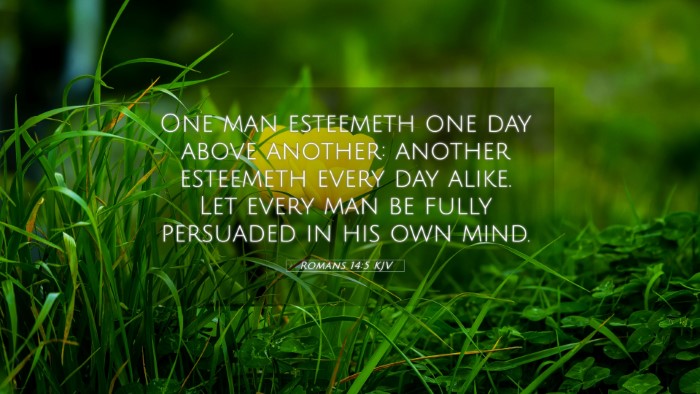Old Testament
Genesis Exodus Leviticus Numbers Deuteronomy Joshua Judges Ruth 1 Samuel 2 Samuel 1 Kings 2 Kings 1 Chronicles 2 Chronicles Ezra Nehemiah Esther Job Psalms Proverbs Ecclesiastes Song of Solomon Isaiah Jeremiah Lamentations Ezekiel Daniel Hosea Joel Amos Obadiah Jonah Micah Nahum Habakkuk Zephaniah Haggai Zechariah MalachiRomans 14:5 Similar Verses
Romans 14:5 Cross References
One man esteemeth one day above another: another esteemeth every day alike. Let every man be fully persuaded in his own mind.
Uncover the Rich Themes and Topics of This Bible Verse
Listed below are the Bible themes associated with Romans 14:5. We invite you to explore each theme to gain deeper insights into the Scriptures.
Romans 14:5 Cross Reference Verses
This section features a detailed cross-reference designed to enrich your understanding of the Scriptures. Below, you will find carefully selected verses that echo the themes and teachings related to Romans 14:5 KJV. Click on any image to explore detailed analyses of related Bible verses and uncover deeper theological insights.

Colossians 2:16 (KJV) »
Let no man therefore judge you in meat, or in drink, or in respect of an holyday, or of the new moon, or of the sabbath days:

Romans 14:23 (KJV) »
And he that doubteth is damned if he eat, because he eateth not of faith: for whatsoever is not of faith is sin.

1 John 3:19 (KJV) »
And hereby we know that we are of the truth, and shall assure our hearts before him.

Romans 14:14 (KJV) »
I know, and am persuaded by the Lord Jesus, that there is nothing unclean of itself: but to him that esteemeth any thing to be unclean, to him it is unclean.

1 Corinthians 8:11 (KJV) »
And through thy knowledge shall the weak brother perish, for whom Christ died?

1 Corinthians 8:7 (KJV) »
Howbeit there is not in every man that knowledge: for some with conscience of the idol unto this hour eat it as a thing offered unto an idol; and their conscience being weak is defiled.

Galatians 4:9 (KJV) »
But now, after that ye have known God, or rather are known of God, how turn ye again to the weak and beggarly elements, whereunto ye desire again to be in bondage?
Romans 14:5 Verse Analysis and Similar Verses
Understanding Romans 14:5
Verse: Romans 14:5 - "One person esteems one day as better than another, while another esteems all days alike. Each one should be fully convinced in his own mind."
Summary of Romans 14:5 Meaning
This verse from the Apostle Paul’s letter to the Romans addresses the issue of personal convictions related to religious observances, particularly regarding days that are considered holy. Paul emphasizes the importance of individual conscience in determining what is right, suggesting that believers may have differing views on such matters but should hold fast to their convictions.
Commentary Insights
- Matthew Henry: Henry explains that this verse emphasizes the need for personal conviction and the freedom that comes with faith. Each believer is to regard their own understanding with sincerity and not judge others who may hold different views.
- Albert Barnes: Barnes discusses the context in which Paul writes—addressing differences between Jewish and Gentile customs. He affirms that it is vital for individuals to be persuaded in their own mind, which allows for a unity in diversity within the Christian community.
- Adam Clarke: Clarke elaborates on the idea that different individuals may have specific days or traditions they cherish due to their background or experiences. He insists that respecting each other’s beliefs fosters harmony among believers.
Comparative Analysis
The theme of individual conviction resonates throughout the scriptures. Below are other Bible verses that complement this understanding:
- Colossians 2:16-17: These verses reiterate not letting others judge regarding food or days, reflecting the freedom believers have concerning such observances.
- Galatians 4:10-11: Paul warns against those who would return to the legalistic observance of days and seasons, emphasizing a need for grace over the law.
- 1 Corinthians 10:31: This verse reminds believers to do everything for the glory of God, emphasizing that one’s actions should reflect their personal relationship with Him.
- James 4:12: In this teaching, James reminds believers that only God is the lawgiver; thus, judging others for their personal choices is unwise.
- Romans 14:10-12: The surrounding passages in Romans provide a broader context for understanding personal accountability to God rather than to one another.
- 1 John 3:20: Even if our hearts condemn us, God is greater than our hearts, showing that personal conviction can sometimes be flawed.
- Philippians 1:9-10: This prayer encourages love that abounds more in knowledge and discernment, highlighting the importance of understanding one’s position.
Linking Bible Scriptures
When conducting a Bible verse cross-referencing study on Romans 14:5, we see numerous connections with other scriptures that reinforce the principles of individual belief and acceptance within the body of Christ.
- 1 Timothy 4:1-5: This passage warns that some will depart from faith and embrace false teachings, affirming the necessity of sound convictions.
- 2 Corinthians 5:10: Stresses that we must all appear before the judgment seat of Christ, indicating personal accountability before God.
- Matthew 7:1: Encourages believers not to judge others so that they may not be judged themselves; fitting well with the principles of Romans 14:5.
Conclusion
Romans 14:5 serves as an important reminder of the diversity found in Christian faith and practice. Believers are encouraged to respect one another’s convictions while remaining true to their beliefs. This passage fosters a culture of understanding and acceptance, emphasizing that each individual’s faith journey is unique and valuable in the eyes of God.
Tools for Further Study
- Bible Concordance: Useful for finding cross-references and similar themes throughout the scriptures.
- Bible Cross-Reference Guide: Essential for detailed study on connections between various verses and passages.
- Cross-Reference Bible Study: A method that aids in understanding the interwoven narratives and themes within the Bible.


